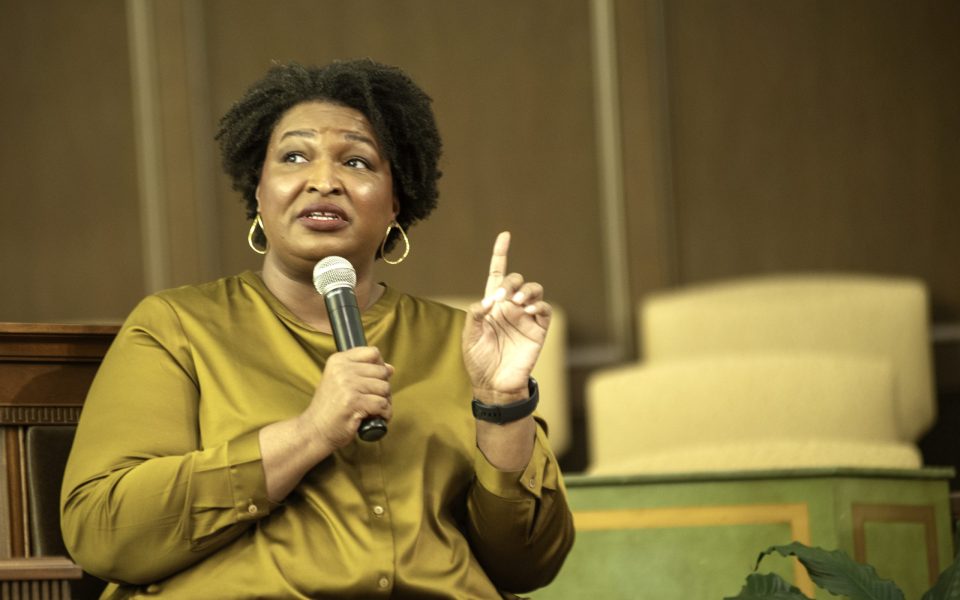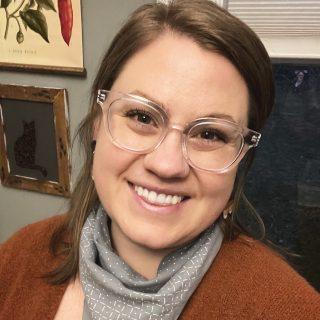Featured photo: Stacey Abrams speaks during a Bookmarks event in the First Baptist Church in Winston-Salem on April 7. (photo by Maaroupi Sani)
Under the vast copper dome and between the Beaux-Arts serpentine columns that mark the sanctuary of the First Baptist Church in downtown Winston-Salem stands a woman whose name is synonymous with voting rights.
Amongst her many successes, former Georgia state Rep. Stacey Abrams is a household name. She’s best known for her 2018 Georgia gubernatorial election nomination and highly publicized loss, her founding of the organization Fair Fight Action and, in 2020, her focused efforts in boosting Georgia voter turnout during both the presidential and special Senate elections. But Stacey Abrams isn’t here to endorse a presidential candidate; she’s not here to register voters. In fact, she isn’t here to discuss the current political climate or politics at all. Standing near the pulpit in an opulent and historic church in front of a crowd of eager and curious faces on April 7, Stacey Abrams is here to let Winston-Salem know that she is a writer.

“I’ve written 15 books,” Abrams laughs as the pews and balconies fill with applause. “It would be nice if people knew that.”
Presented by Bookmarks, a literary arts nonprofit located in Winston-Salem, with the financial support of Kilpatrick Townsend law firm, Abrams launches the paperback edition of her 15th novel and political thriller, Rogue Justice.
“My writing often is overshadowed by the other things that I do,” Abrams tells the audience, “but it’s also dismissed as this thing that I do as opposed to something that’s been a part of my life as long if not longer than politics. For me, storytelling is a part of how I do my service.”

Abrams opens the discussion with Marguerite Casey Foundation President and CEO, Dr. Carmen Rojas.
“Carmen I know this is your show,” Abrams says, laughing, “but we’re going to do something so that we have people here who remain friends.”
Abrams and Rojas step down from the elevated pulpit to encourage the audience to take pictures now and put their phones away until later. They then engaged in a round robin photography session for each section of the audience, complete with pageant waves and a hug for Abrams from a young audience member.
As they sit down to begin, Rojas sighs with a smile.“You know how you come prepared for something?,” she asks, waving her notecards. “I came with my little talking points. Now they all seem cheap,” she says with a self-deprecating laugh.

Abrams and Rojas work together on the board of the Marguerite Casey Foundation, and their familiarity and friendship is palpable. The room is joyous, the acoustics echoing with laughter after every story of sibling pecking order or past publication denials.
Her first attempt at a novel, a story of love-lost angst that Abrams swears will never see the outside of her mother’s home, was written when she was 12.
Abrams’ catalogue includes romance, thrillers, political thrillers, fiction, non-fiction and children’s books, but her method of writing remains the same throughout.
“Whether I’m writing children’s books or legal fiction, you have to capture the reader’s imagination. The fact that it’s true does not mean it has to be boring,” she says. “You have to explain why it matters. You’ve got to complicate it so people understand why they matter. And then you have to give them something to do about it.”

Rogue Justice is published as a sequel to another Abrams’ thriller, While Justice Sleeps. Both stories follow fictional Supreme Court clerk Avery Keene through international conspiracies, political tussles and the plotted sinister patterns of political elites.
When asked what inspires the conspiracies at the center of her political thrillers, Abrams explains.
“My youngest sister is an evolutionary biologist doing genetics, and my oldest sister is an anthropologist so I was thinking about the two of them,” she pauses with a smile. “What could they create if they were terrible people?”
Abrams began her fiction writing career at a young age. Her mother worked as a librarian. Her father, on the other hand, worked late hours at a shipyard more than 45 minutes away from where they lived. He would come home late at night, just in time to share a bedtime story with Abrams and her five siblings.
“Between both my parents, I realized that there is the art of storytelling and the art of writing good fiction,” she explains. “When you’re little and you tell stories, if you say them out loud you’re a liar. But if you write them down, you’re a storyteller.”

Even in Abrams’ compellingness to convince the audience that she is a writer, her experience and passion for politics slips into even the smallest details in each of her pieces. Abrams’ worlds blend seamlessly, creating a story that inspires whether it be to march to the voting booth or to turn the page to the next chapter.
“In 2018, when I stood for governor, I needed people to break several narratives in their head,” she explains. “I needed people to believe that we could win elections in a time when losing was just what we did. I needed to convince people of color. I needed to convince young people, rural communities. All these groups that did not see themselves. The narrative thread I used then was, What Georgia could you imagine? The most effective narrative in politics and storytelling is not one that you impose but one that you help pull out. It’s when you give people space to start imagining what comes next.”
Rogue Justice is available in paperback and hardcover copies. Visit Bookmarks in Winston-Salem or Scuppernong Books in Greensboro to purchase.
Join the First Amendment Society, a membership that goes directly to funding TCB‘s newsroom.
We believe that reporting can save the world.
The TCB First Amendment Society recognizes the vital role of a free, unfettered press with a bundling of local experiences designed to build community, and unique engagements with our newsroom that will help you understand, and shape, local journalism’s critical role in uplifting the people in our cities.
All revenue goes directly into the newsroom as reporters’ salaries and freelance commissions.


Leave a Reply